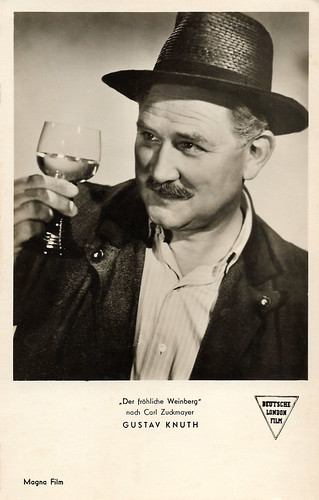
West-German postcard by Kunst und Bild, Berlin, no. A 670. Photo: Deutsche London Film / Magna Film. Gustav Knuth in Der fröhliche Weinberg/The Grapes Are Ripe (Erich Engel, 1952).
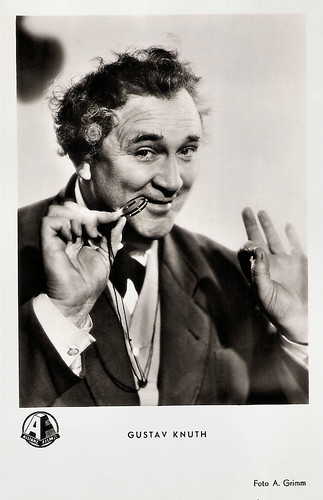
West-German postcard by Kunst und Bild, Berlin, no. A 1051. Photo: Allianz Film / A. Grimm. Gustav Knuth in Die Raub der Sabinerinnen/Theft of the Sabines (Kurt Hoffmann, 1954).
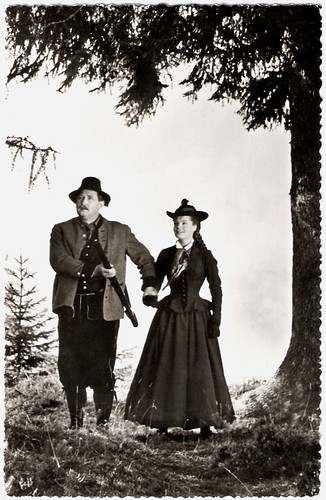
Dutch postcard by Drukkerij Uitgeverij Int. Filmpers (I.F.P.), Amsterdam, no. 1245. Photo: publicity still for Sissi (Ernst Marischka, 1955). Romy Schneider as Sissi and Gustav Knuth as her father Duke Max in Bavaria at their own hunting ground.
The 'new morals' in Nazi Germany
Gustav Adolf Karl Friedrich Knuth was born in Braunschweig, in 1901. His parents the Reichsbahn conductor Christoph Karl Gustav Knuth, and Johanna Friederike Luise Hermine Knuth, née Jürges. Pushed by his father into a locksmith apprenticeship after primary school, he broke off this training and, financed by his sister Else, took acting lessons with the actor Casimir Paris in Braunschweig.
Through his mediation, he received his first engagement at the Stadttheater Hildesheim in 1918. This was followed by the Stadttheater Harburg from 1919 to 1922. Between 1922 and 1925 he played at the Stadttheater Basel, from 1925 to 1933 at the Stadttheater Altona. From 1933 to 1936 he worked at the Deutsches Schauspielhaus in Hamburg. Gustav Knuth was appointed state actor in 1935. A year later, he was contracted by the "Preußische Staatstheater" in Berlin, where he stayed until 1945.
Since 1935 Knuth also appeared in front of the film camera. He made his film debut as a virile village blacksmith in Der Ammenkönig/The King of the Blackbirds (Hans Steinhoff, 1935). The film became a surprise success and was accompanied by a debate about the 'new morals' in Nazi Germany.
In the following years, he played mostly quite inconspicuous, plain, and somewhat awkward lovers. These films included Schatten über St. Pauli/Shadows Over St. Pauli (Fritz Kirchhoff, 1938) with Marieluise Claudius, the Krimi Der Vorhang fällt/The Curtain Falls (Georg Jacoby, 1939) starring Anneliese Uhlig, and the drama Zwischen Hamburg und Haiti/Between Hamburg and Haiti (Erich Waschneck, 1940).
Knuth also appeared as a shy seaman in Helmut Käutner's Große Freiheit Nr. 7/Great Freedom No. 7 (1943). He considered his best film to be the melancholic Unter den Brücken/Under the bridges, also directed by Helmut Käutner, which was shot in 1944 but not shown until 1946.
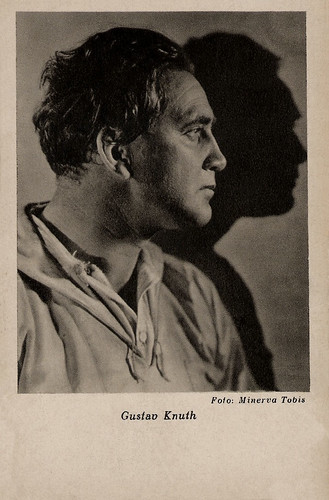
German postcard by Das Programm von Heute, Berlin. Photo: Minerva / Tobis. Gustav Knuth in Heimweh/Homesick (Jürgen von Alten, 1937).
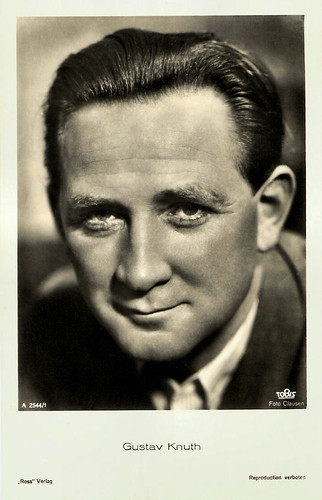
German postcard by Ross Verlag, no. A 2544/1, 1939-1940. Photo: Tobis / Clausen.
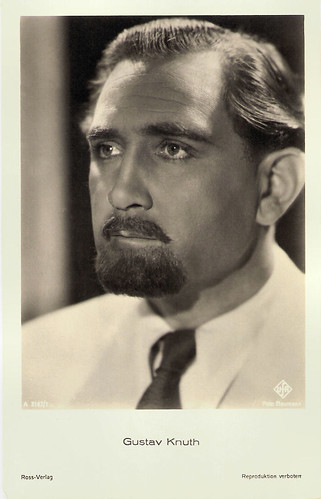
German postcard by Ross Verlag, no. A 3167/1, 1941-1944. Photo: Ufa / Baumann. Gustav Knuth in Zwischen Hamburg und Haiti/Between Hamburg and Haiti (Erich Waschneck, 1940).
The grumpy but cheerful Duke Max in Bayern
Between 1945 and 1949 Knuth worked again at the Deutsches Schauspielhaus Hamburg, among other places. In 1946, the British occupying power appointed him as a representative of the cultural workers in the appointed citizenship of Hamburg. In the first elections to the Bürgerschaft in the same year, he stood as the leading candidate of the 'Freien Kulturpolitischen Bundes' party (Free Cultural-Political Alliance), but was unsuccessful and did not enter parliament.
From 1949 he belonged to the ensemble of the Schauspielhaus Zurich. There he played together with Therese Giehse, among others. Friedrich Dürrenmatt wrote the role of the scientist Beutler for Knuth in his play 'Die Physiker'. This play was staged for television in 1964 by Fritz Umgelter with Knuth and Giehse in the roles written for them.
In the cinema, he made his comedic signature performances in the comedy Der fröhliche Weinberg/The Grapes Are Ripe (Erich Engel, 1952) and as bribery director Striese in Der Raub der Sabinerinnen/Theft of the Sabines (Kurt Hoffmann, 1954). He also starred in the Sissi trilogy as the grumpy but cheerful Duke Max in Bayern (Sissi's father), alongside Romy and Magda Schneider.
Exceptional was his negative role as an arms smuggler in the drama Die Mücke/The Mosquito (Walter Reisch, 1954) starring Hilde Krahl. Furthermore, Knuth played the Puszta stationmaster in Ich denke oft an Piroschka/I Often Think of Piroschka (Kurt Hoffmann, 1955), motor carrier Karl John in Die Ratten/The Rats (Robert Siodmak, 1955) with Maria Schell, and the intrusive debaucher in Das kunstseidene Mädchen/The High Life (Julien Duvivier, 1959), starring Giulietta Masina.
He transcended his roles with a witty lack of emotional commitment. He was also active from time to time as a radio play narrator. In 1953, for example, he played one of the leading roles as Philip Droste in the third Paul Temple multi-part 'Paul Temple und der Fall Vandyke' (Paul Temple and the Vandyke Case) by crime author Francis Durbridge, directed by Eduard Hermann.

German postcard by Ross Verlag, Berlin, no. A 3414/1, 1941-1944. Photo: Baumann / Ufa.
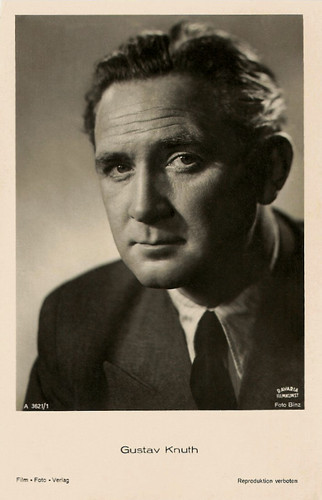
German postcard by Film-Foto-Verlag, Berlin, no. A 3621/1, 1941-1944. Photo: Binz / Bavaria Filmkunst.
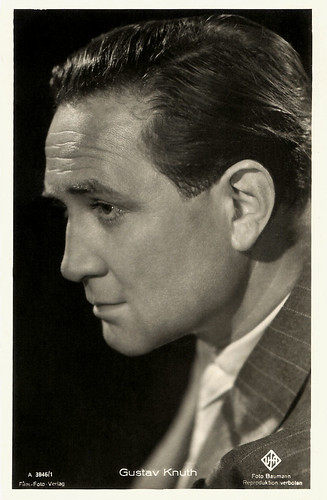
German postcard by Film-Foto-Verlag, Berlin, no. A 3846/1, 1941-1944. Photo: Baumann / Ufa.
The last cab driver with a horse-drawn carriage in Berlin
With the breakthrough of television in the 1960s, Gustav Knuth became better known among the general public. As the veterinarian Dr. Hofer in the series Alle meine Tiere/All my animals (Otto Meyer, 1962-1963), he quickly became a public favourite. During the 1960s and 1970s, he was one of the most outstanding German TV actors, playing popular, good-natured characters in numerous films and series.
He had further success with the family series Großer Mann, was nun?/Big man, what now? (Eugen York, 1967-1968). In the popular circus series Salto Mortale (Michael Braun, 1969-1972), he played the veteran trapeze performer Carlo Doria, the leader of a family of artists. The 26-part family series Drüben bei Lehmanns (Herbert Ballmann, 1970-1973) with Walter Gross and Brigitte Mira, was also very popular.
In 1979 Knuth appeared as Gustav, the last cab driver with a horse-drawn carriage in Berlin in the late 1920s in the TV Mini-series Der eiserne Gustav/Iron Gustav (Wolfgang Staudte, 1979). He played his last role in the cinema in Der Bockerer (Franz Antel, 1981).
Gustav Knuth was married to Gustl Busch. Their son Klaus (1935-2012) also became an actor. The marriage was dissolved in the 1930s. Then Gustav married his colleague Elisabeth Lennartz. The actress Nicole Knuth is his granddaughter. In 1974, Knuth published his memoirs 'Mit einem Lächeln im Knopfloch'. In 1977, he died from the effects of a heart attack in Küsnacht, near Zurich, Switzerland. Gustav Knuth was 85. His last resting place is in the cemetery of Hinterriet in Küsnacht.
He was awarded the Ernst Lubitsch Prize for his artistic performance in Der Lügner (1962). In 1967, 1968, and 1980, he received a Golden Bambi in each case, in 1970 a Silver Bambi. In 1976, he received the Goldene Kamera for his hosting of the celebrity talk show Künstlerstammtisch. For his long-standing and outstanding work in German film, he was awarded the "Goldene Filmband" in 1974.
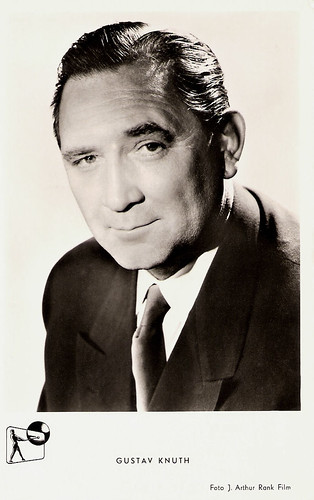
German postcard by Kunst und Bild, Berlin, no. A 977. Photo: J. Arthur Rank Film. Gustav Knuth in Die Nacht ohne Moral/The night without morals (Ferdinand Dörfler, 1953).
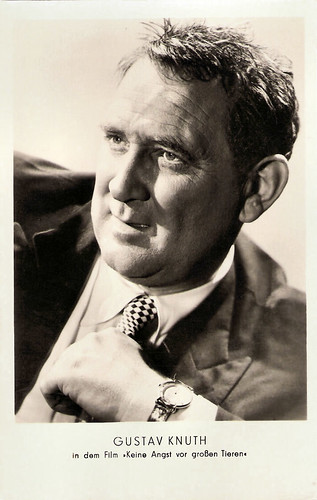
East-German postcard by VEB Volkskunstverlag Reichenbach i.V., no. G 7C6. Photo: Real v. Mindszenty, 1956. Gustav Knuth in Keine Angst für grossen Tieren/Not Afraid of Big Animals (Ulrich Erfurth, 1953).
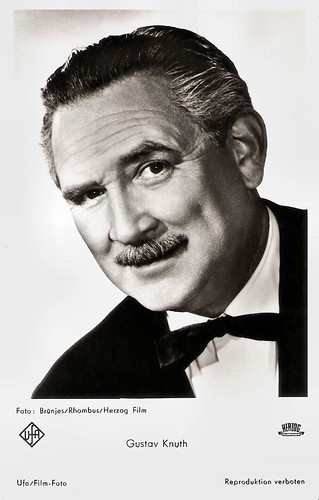
West-German postcard by Ufa/Film-Foto, Berlin-Tempelhof, no. FK 3822. Photo: Brünjes / Rhombus / Herzog Film. Gustav Knuth in Das Schloss in Tirol/Castle in Tyrol (Géza von Radványi, 1957).
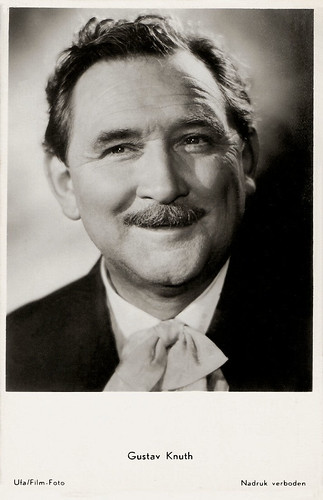
Dutch postcard by Gebr. Spanjersberg N.V., Rotterdam, no. 1049. Photo: Ufa/Film-Foto.
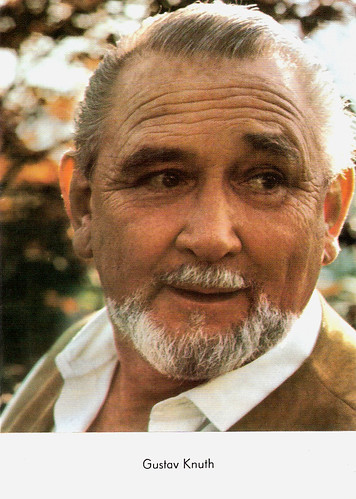
German postcard by Rüdel-Verlag, Hamburg.
Sources: Filmportal.de, Wikipedia (Dutch, German and English), and IMDb.
No comments:
Post a Comment